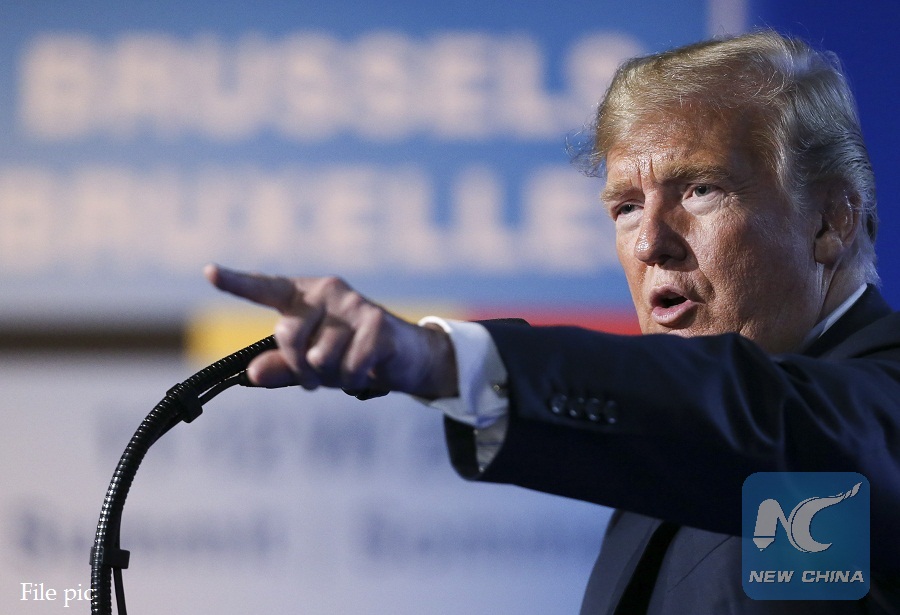
U.S. President Donald Trump speaks during a press conference on the second day of the NATO Summit in Brussels, Belgium, on July 12, 2018. (Xinhua/Ye Pingfan)
LONDON, July 14 (Xinhua) -- As the helicopter-whisked dust settled on Donald Trumps's whirlwind visit to Britain, Fleet Street went into overdrive in giving its verdict on the president's first visit since moving into the White House.
Quentin Letts, political sketchwriter for the Daily Mail said of the U.S. president: "Is he a braggart? Of course. He kept saying how great he was, what a great job he was doing, praising himself almost more than he praised his 'incredible' hostess (Prime Minister Theresa May)."
Letts asked: "Does he bluster? You bet. Is he a bully? It is the bluster of a real estate deal-maker, of a man who, as he tours the world, stirs up as much dust as his helicopter's blades. It is vulgar but it is also, after decades of political blandness, undeniably electrifying."
The Guardian said May should have grasped that the U.S. president is an enemy of stability in Europe, adding now she should learn from her mistake.
"It may once, but oh so briefly, have seemed like a good idea to invite Donald Trump to Britain. But for Theresa May it all turned into a wrecking visit by the ally from hell. To make things worse, it was entirely her own fault," the editorial said.
And yet, it added, some good may unexpectedly have come from the Trump visit.
"Mrs May should have grasped from the very start that Mr Trump was not an ally when it came to her Brexit strategy. Mr Trump wants to break up international organisations like NATO and the EU. He embraced Brexit on that basis. He saw it as the start of a swing back towards nativist, illiberal, often racist nationalist politics, of which his own election was a further example."
The Guardian said for May, fighting to control her Conservative party on the dominant issue facing Britain, it was simply a stab in the back. "But it wasn't fundamentally personal. It was a declaration of hostility to Britain and Europe and the values they stand for."
Offering words of advice, the editorial added: "She now needs to learn the lesson, and to lead Britain, Brexit or no Brexit, into a constructive and effective relationship with our more dependable allies, who share our values, in Europe."
The Daily Telegraph commented that the paradox is that the U.S. President is more enthusiastic about Brexit than the Prime Minister of the United Kingdom, suggesting May's vision of Brexit is a damage limitation exercise.
"Civil servants and the Treasury have clearly told her that safeguarding the status quo in the European goods trade is what really matters; everything else is a devil to be buried in detail," it said in an editorial.
The European courts can still have their say; there will still be some form of freedom of movement. Britain will pay 39 billion pounds for the chance to go on obeying EU rules and regulations, the editorial added.
Describing Trump as baffling as ever, the Independent, said: "If the leader of the country we wish to make a deal with says it is unlikely, then it sounds unlikely."
Next week, the editorial continued, May faces MPs' amendments to her customs bill, and Trump has added substance to the arguments of those who want a so-called hard Brexit.
"Like the Trump baby blimp floating around in the skies above Westminster, Mr Trump's rhetoric was pretty inflated. If only the special relationship was actually operating at such stratospheric levels of specialness. What seems to have happened is that Mr Trump had reverted to his usual, baffling pattern of behavior before meeting other world leaders."
There was a more welcoming response from the Daily Express.
In its editorial, the newspaper said: "Make no mistake: whatever the U.S. President may have said in an unguarded moment earlier in the week, the leader of the free world wants to do business with us. And the timing could hardly be better. The UK and the U.S. have always had common interests and common goals. Let us now see these put into play."

